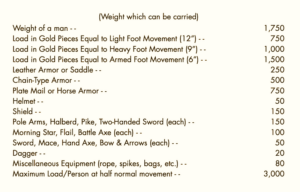
Back in March, prompted by a discussion on Discord, I was perusing Jon Peterson’s Playing at the World to see if there was any discussion of rerolling HP on level up. Sadly, I was unable to locate anything about this topic, but reading several sections about XP did prompt another idea: what if the amount of XP a character could earn during an adventure excursion was inversely related to their encumbrance? That is, the less gear you carry, the more XP you can earn. There are several reasons that this might make more sense than is apparent at first glance.
The passage that prompted my line of thought follows:
The maximum encumbrance that a character can carry is 3,000 gold pieces worth—the choice of the gold piece as the base unit of weight measurement is certainly a wise one, given the expected course of gameplay. At any encumbrance above 1,500, characters must move at half their normal speed. This threshold is surprisingly easy for a Fighting-man to reach; an example in Men & Magic of a character with plate armor, a helmet, a shield, a flail, a dagger, a bow with a twenty-arrow quiver and a few miscellaneous sundries already wears 1,200 gold pieces worth of encumbrance, and thus can pick up only 300 more without incurring a penalty.
Peterson, 2012; §3.2.2.2 Endurance and Mitigation
The original game rules can be found in Men & Magic, page 15; see post image. Gold pieces are the currency of advancement if using some form of XP awarded for recovering treasure. Measuring and tracking encumbrance using such a high-resolution unit has up until now generally struck me as a particularly masochistic form of bookkeeping with few, if any, redeeming qualities. However, if encumbrance limits advancement, players can see the open “XP slots” in the unit of potential advancement. In essence, this approach puts a clear price on preparedness and, more to the point, provides an incentive for adventuring on various forms of hard mode. Conan in a loin cloth and carrying only a 50 GP-weight broadsword can earn a lot more experience than a tanked up fighter in plate dripping with armory and utility belts.
How would this work, exactly? According to Men & Magic, the maximum load at half normal movement is 3000 GP. This could be the excursion XP limit. A character who sets out with no gear could earn up to 3000 XP on the excursion while a character who sets out equipped with plate armor (weight: 750 GP) and battle-axe (weight: 100 GP) could earn up to 2150 XP (3000 – 750 – 100 = 2150). Note that throughout this post I am using the term excursion to denote adventuring time between downtime (what I call haven turns in my hazard system terminology). A single game session could involve multiple excursions (going back to town and setting out again). I can see a case for other potential limits as well, perhaps also keyed to the amount of XP required for next level. A 3000 XP per excursion limit would clearly break down at mid to high levels, so how to handle the upper range of levels requires some additional thought. Perhaps this would be a rule for “basic” level play (up to level 3 or up to level 5).
This approach could also help players pace the advance/retreat (risk/reward) cycle. One dynamic I have noticed over many years of play using treasure XP is that the ideal of matching adventurer excursion to game session (that is, ending each game session in a haven), is not realized as often as I might like. This is not the worst thing in the world, but ending in town does have some benefits. There is no need to remember exactly the circumstances of ending in the middle of action and it facilitates drop in play. The “XP potentiality” number, clearly reckoned, also would serve, I imagine, as a play goal, indicating clearly when it would make sense, at least in terms of XP reward, to retreat and bank XP.
What prevents players from loading all their gear onto retainers in town and venturing into the unknown wearing nothing but a loincloth with full XP potential, only to gear up on the road? Well, remember that retainers, though often controlled by players for practical gameplay reasons, are still NPCs at base when it comes to particularly weighty decision points, such as morale checks. Such an exploit seems like the kind of ridiculous Vancian situation that might test the loyalty of a long suffering retainer. Many other ways around the rule, such as taking gear from enemies, seems like exactly the kind of creative and varied solution that makes gameplay interesting.
My misgivings regarding heavy bookkeeping have not been completely erased, and some prosthetic or shorthand might still be required to make the above idea fluent in play, but writing down the game logic makes me think it might be worth giving a try.
